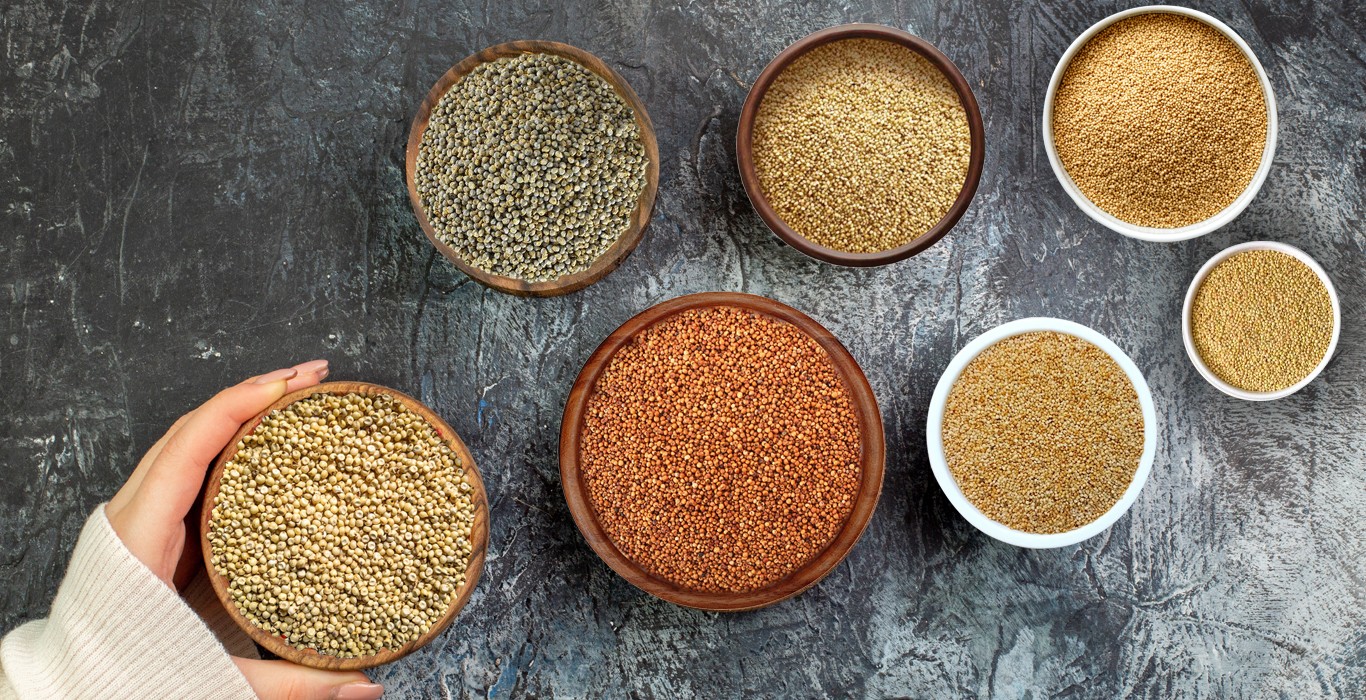Millets are known as Nutri-cereals due to their impressive nutritional profile. They are powerhouses of nutrition and provide various essential nutrients to your body. To increase awareness about its incredible health benefits, Food and agriculture organization has declared 2023 as the international year of millets.
Millets come in several varieties and each one has unique properties. They provide great benefits for your health.
What are the top 7 Indian millets and their health benefits? Read the post to know more!
Finger millet or Ragi
Finger millet or ragi is one of the most popular varieties of millet. Finger millet or ragi has amazing body cooling properties. Ragi is considered a great food option to consume during summer weather. Ragi or finger millet is high in protein, iron, calcium and various essential amino acids. Nutritionally, 100 grams of ragi provide 344 mg of calcium and plays a vital role in maintaining bone health and preventing osteoporosis.
Furthermore, ragi has a low glycemic index and high fiber content. Thus, it is a good cereal option for diabetics and helps in managing blood sugar levels. The high iron content of Ragi or finger millets helps in dealing with anemia. Finger millet is also the best baby weaning food.
Sorghum millet or jowar
Sorghum millets or jowar is the next popular variety of millets. Sorghum flour is an immensely popular flour in various parts of India. People make jowar roti, Chilla and Bhakri with jowar flour, especially during the winter season. Nowadays, jowar flakes are available as a breakfast cereal option too.
Sorghum millet is a gluten-free grain. It is the best cereal option for those who have gluten allergies.
Moreover, sorghum millets are high in fiber. The high fiber content in Jowar or sorghum helps in improving digestion and reduces the risk of diabetes, cardiovascular disease and other lifestyle diseases. Sorghum millet also helps in the weight loss process and reduces bad cholesterol levels.
Pearl millet or bajra
Pearl millet or bajra is another well-known millet that is used in the Indian households frequently. Pearl millet is considered an amazing winter food and has incredible thermogenic properties. This property boosts metabolism and regulates body temperature during winter.
Moreover, bajra or pearl millet is great for heart health. It contains a high amount of magnesium and helps in lowering the blood pressure.
Foxtail millet or Kangni
Foxtail millet or kangni is the next amazing millet that provides various incredible health benefits. Foxtail millet is a rich source of Vitamin B12 and helps in regulating the nervous system functions. Being smaller in size, foxtail millet can be used as an excellent substitute for rice in various recipes. Moreover, foxtail millet is a powerhouse of nutrition. It helps in building stamina and boosts immunity. Just like all other millets, foxtail millet is also a low-glycemic index food and helps in regulating blood sugar levels.
Barnyard millet or Sanwa
Barnyard millet is also known as Sanwa, Moraiyo or mordhan. It is low in calories and tastes like broken rice. It is a popular cereal used during fasting in the Indian culture. It can be used to make various amazing recipes like Sanwa khichdi or upma during fasting. Additionally, barnyard millet is a rich source of protein, iron and fiber. The high iron content in barnyard millet makes it a significant source of iron for vegetarians.
Amaranth millet or Rajgira
Amaranth millet or Rajgira in recent times has gained immense popularity as a superfood. Amarnath is high in protein. Nutritionally, one cup of amaranth provides 9 grams of protein and helps in muscle repair and facilitates quick recovery. Amaranth also has excellent anti-inflammatory properties and reduces inflammation. Being gluten-free, amaranth is a great choice of cereal for people who suffer from gluten sensitivity. Despite being a grain, amaranth is an excellent source of Vitamin C and helps in strengthening the immune system.
Kodo millet or Araka
Kodo millet or Araka is a well-known millet that provides amazing health benefits. Kodo millet contains a good amount of lecithin and helps in strengthening the nervous system. This millet is a great choice of cereal for post-menopausal women who show signs of cardiovascular disease. Kodo millet is also rich in antioxidants and helps in neutralizing free radicals. In this way, it helps in preventing cancer. Moreover, Kodo millet reduces knee and joint pain. You can use Kodo millet for making various recipes like Dosa, khichdi etc.
Here’s a roundup of all the popular Indian millets. How many do you include in your daily diet?







